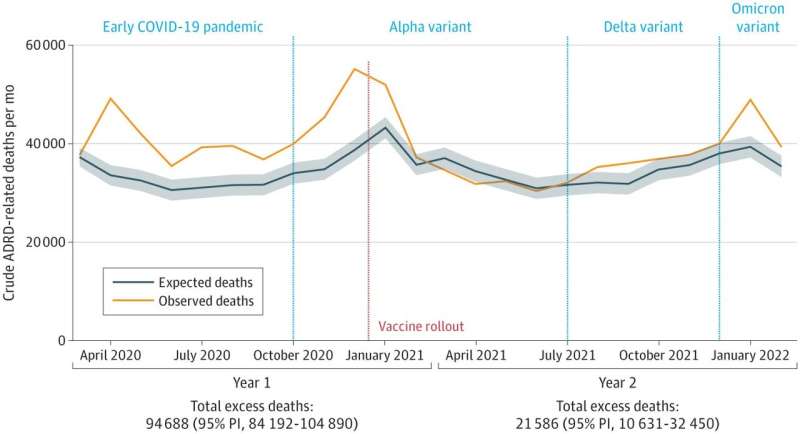This article has been reviewed according to Science X's editorial process and policies. Editors have highlighted the following attributes while ensuring the content's credibility:
fact-checked
peer-reviewed publication
trusted source
proofread
COVID-19 vaccines saved dementia patients' lives in nursing homes, finds new study

Deaths among older adults with dementia fell starkly in nursing homes and long-term care centers after COVID-19 vaccinations became available, yet remained high for those living at home, according to a new study led by UC San Francisco.
The nationwide study published in JAMA Neurology, is the first to use data from 2019 to 2022 to quantify "excess" deaths—or those above what would have been anticipated had there been no pandemic—taking into account age, sex, racial and ethnic groups, as well as the settings where people died.
In the first year, there were 509,179 dementia-related deaths in the U.S. among people 65 and older, which the researchers estimated was 94,688 more than would be expected in that population if the pandemic had not occurred. In the second year, the number of excess deaths dropped by 77% to 21,586.
The decline in mortality shows people with dementia generally benefited from the COVID-19 vaccines that became available in December of 2020, as well as from new treatments.
Dementia deaths declined in every age, sex, racial and ethnic group evaluated among those in long-term care and nursing homes. But deaths did not decline nearly as much for those who remained at home. Among the home-based population, there were 34,487 excess deaths in the first year of the pandemic. That decreased by just 16% to 28,804 in the second year.
"Older adults with Alzheimer's Disease and related dementias are very vulnerable to the COVID pandemic," said Ruijia Chen, ScD, MS, a postdoctoral fellow in epidemiology and biostatistics at UC San Francisco and first author of the paper. "What we were trying to understand with this paper is whether the excess deaths actually declined after the vaccines became available."
Nursing homes were an early epicenter of the COVID-19 pandemic. Older people with dementia were especially susceptible to contracting the virus and dying from it due to comorbidities, difficulties adhering to infection control protocols, disruptions in care and isolation from family members and caregivers.
The pandemic also saw significant disparities in excess deaths among ethnic groups, with higher rates of infection, hospitalization and death among Black, Latino and Asian patients, compared to non-Hispanic white people.
Researchers analyzed data from the National Center for Health Statistics (NCHS) to compare deaths from the first year of the pandemic (March 2020 to February 2021) to the second (March 2021 to February 2022).
Many of the oldest, frailest nursing home residents were lost in the first year of the pandemic, although that doesn't fully explain the trend.
The researchers said other factors could have played a role. Nursing home residents were among the first to receive the vaccines, while their delivery was not as well coordinated for those at home. Loneliness and social isolation also likely played a role for those remaining in the community, along with deferred medical care and the shift to virtual care, which is difficult for this population to access.
"The declining mortality in long-term care settings when vaccines became available show how lives can be saved when systems are in place to achieve comprehensive access to vaccinations," said Maria Glymour, ScD, MS, senior author of the paper. Now chair of the Department of Epidemiology at Boston University, Glymour conducted the research when she was at UCSF. "Our findings suggest critical resources to make COVID-19 a survivable infection—most importantly vaccinations for themselves and those around them—are not reaching older adults living at home."
More information: Ruijia Chen et al, Excess Mortality With Alzheimer Disease and Related Dementias as an Underlying or Contributing Cause During the COVID-19 Pandemic in the US, JAMA Neurology (2023). DOI: 10.1001/jamaneurol.2023.2226 jamanetwork.com/journals/jaman … /fullarticle/2806770


















